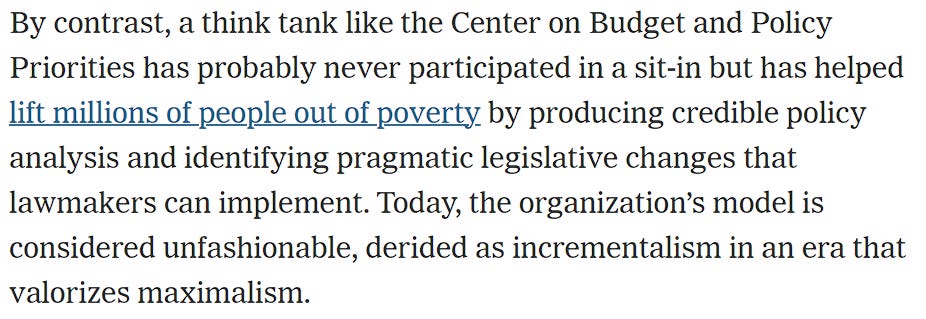"The Groups" and the Backlash
Think tanks are great. I work for one. But we also need constituency-based mobilization.
On Saturday, Adam Jentleson, formerly a top aide to Senators Harry Reid and John Fetterman, published an op-ed, already much commented on, joining Matt Yglesias, Jonathan Chait and others of a similar perspective in blaming “the groups” — that is, single-issue policy organizations that tend to demand progressive policy commitments from elected officials — for Kamala Harris’s failure to win the 2024 election. Democrats need to learn to “say no” to requests for promises such as a fracking ban or single-payer health insurance, Jentleson argued.
My general reaction to the argument is mixed. On the one hand, some demands will have other political consequences that politicians should consider. As long as I’ve paid attention to politics, successful Democratic candidates have tried to dodge making commitments to win party primaries that will cost them in a general election. But much of Jentleson’s claim about 2024 hinges on commitments made five years ago, in the run-up to the 2020 primaries, when the progressive “lane” was crowded and Harris, much like Julián Castro, overbid for that slot.
At the same time, I don’t think Democrats should preemptively compromise on matters of basic human rights and dignity, and they should at least listen to groups that have large, mobilized constituencies that can provide meaningful support, such as organized labor or the abortion-rights movement. It’s true that there are groups that have a staff and presence in DC, but don’t really have the constituency they claim, and thrive mainly on financial support from foundations. Democratic politicians should be able to recognize them.
I also liked Jentleson’s suggestion of “supermajority thinking” for Democrats — to think broadly rather than narrowly about potential allies. But that seems more an indictment of the obsession with data and microtargeting voters as it is of “the groups.”
But mainly I want to zoom in on one paragraph that I haven’t seen mentioned in all the discussion, in which Jentleson singles out his model of an effective “group,” one that I basically share:
My admiration and respect for the Center on Budget and Policy Priorities is boundless and goes back to the 1990s, when I worked for a progressive member of the Senate Finance Committee. At one time, I knew almost everyone who worked at the Center on Budget, and I still know the main phone number by heart (408-1080). As a foundation program officer, I helped expand its network of state-level affiliates, which has proven extraordinarily effective at improving policies for low-income families in the states.
But I’m mystified by Jentleson’s assertion that the Center’s approach is now “considered unfashionable.” According to the public tax information available at Pro Publica, the Center’s revenues (largely grants from charitable foundations) more than doubled between 2018 and 2022. I have no doubt that if the Trump administration attempts to cut Food Stamps and Medicaid as a way to pay for tax cuts, as reported, the Center will be there with the analysis that will help make the case against those cuts or moderate their impact, just as their analysis helped block George W. Bush’s move to privatize Social Security in 2005.
But as valuable as it is, such policy work is rarely enough on its own. Analysis and data won’t encourage politicians to recognize that there will be political consequences for their choices. For that, they need to see and hear a mobilized constituency. The Center on Budget’s strategic genius is that it knows exactly what it’s good at and sticks closely to it. But such an organization—and this is also true of its state affiliates—is more effective working in a coalition, or at least in parallel with other kinds of activist groups that do other things.
This may seem a nitpicky thing, but I was taken aback by the blanket critique of “the groups,” while singling out for exception one particular group, even though I share Jentleson’s admiration for it.
Finally, my view is that the problem is not so much “the groups,” their funders, or a particular set of tactics. I think the problem is “Overton Window” thinking — that is, the pervasive idea that by advocating a policy proposal that’s outside of what’s currently on the agenda, one can shift the window of what’s considered possible, and get a better result even if it falls short of your demand. For example, demanding single-payer health insurance moves the window in that direction and the result might be better health policy even if not the ideal.
But there’s really no such thing as the “Overton Window.” It’s not a political science theory, much less a law. The man credited with it, Joseph Overton, was a fundraiser for a libertartian think tank in Michigan, the Mackinac Center. It was a clever fundraising pitch for his organization.
Sometimes putting an out-there idea on the agenda might work. For example, there’s some speculation that Trump’s nomination of Matt Gaetz as attorney general will fail but make it easier for another nefarious or unqualified candidate to be confirmed. We’ll see. But often taking such positions simply takes an organization out of the conversation entirely. As Jentleson says, it also forces a difficult choice on politicians asked to support a constituency. It would be better if everyone — “the groups,” politicians, funders, etc. — just thought through what they really think would be good, achievable policy, with some support from policy organizations as needed, and advocated for that.



nice dad